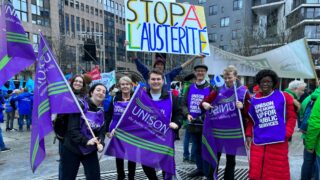
UNISON conference delegates have pledged to fight back to stop the rot of poverty pay in local government.
In the central debate of the two-day conference, speaker after speaker told of the impact of austerity on the people who provide our local public services.
Shirley Scott, Sunderland branch, told delegates: “I am a low paid woman in local government. I moved into the public sector because at the time it was better paid and more secure. Now I earn £6.53 an hour – only just above the living wage.
“I work three jobs to make up full time hours. This must be the year when we all pull together for a decent pay increase.”
Conference united behind a series of motions and an emergency composite which applauded the decision to call a ballot for strike action and welcomed the plans to follow the first strike day on 10 July with two consecutive days in September if the employers have not reopened negotations.
Members are currently voting on industrial action with the ballot closing on 23 June.
The emergency composite calls for the resources of the entire union to be used to support the campaign and for a strategy to keep momentum up over the summer.
For the service group executive, Glen Williams said: “Make no mistake: we will be strong. We will be bullish. We will fight back, and we will strike.”
And Sue Glithero promised delegates “an outward-facing campaign during the summer as we build to further strikes. We will be co-ordinating action within the union and within the TUC as much as we can.
“Your service group executive is up for the challenge – now we need all branches to support us.”
Angela Raynor, North West region, promised that “we are not prepared to see local government and school workers having their faces ground in the dirt, day after day. We can’t count our ballot chickens, but we can be positive and determined in our resolve.”
Nicky Ramanandi, Newcastle City branch said: “We know there is a job to do. Our branches have campaigned hard on the need to vote and why we are recommending a rejection of the offer. But once the ballot is closed, we must continue to campaign to ensure a show of strength in July.”
Earlier, conference heard how years of pay freezes had seen pay in England, Wales and Northern Ireland lose 18 per cent of its real value.
Although Scotland has different negotiating arrangements, members there also told how a disproportionate amount of the cuts had fallen on local government.
And a new UNISON survey revealed that some 77 per cent of local government members had cut back their spending on food just to make ends meet.
Jane Iles, UNISON Cymru/Wales told how her branch in Bridgend had recently beaten off the council’s plan to drop out of national bargaining structures. “We campaigned, we galvanised and we won,” she said.
“We can mobilise our members. We must mobilise our members and we will stop the rot of poverty pay in local government.”





